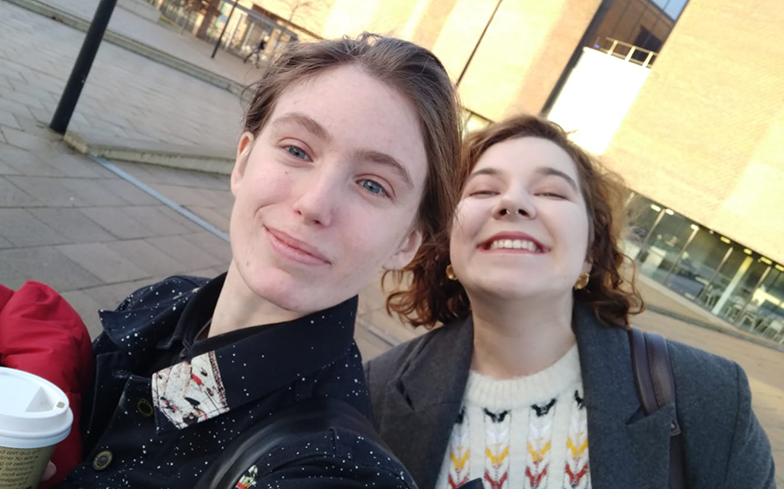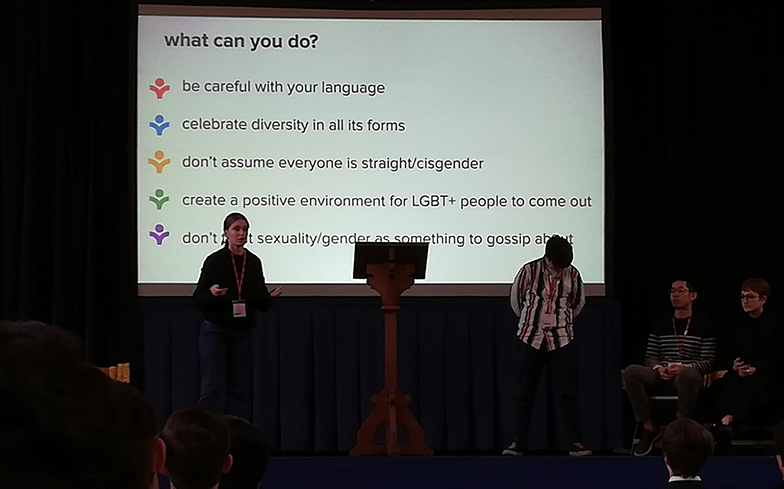
International Transgender Day of Visibility is a fantastic day for the trans community to celebrate, raise awareness and display their wonderful diversity and resilience, but while I was writing this piece in the days leading up to today, I understood why this day is more vital than ever.
Relating it to my own experience, I think back to all the times I haven’t felt visible as a trans man. Volunteering as an Ambassador with Just Like Us – going into schools to deliver talks on LGBTQ equality – has given me a platform to share my experience, and to be visible to trans kids, who still lack appropriate representation. But there is still a lot to be done to make sure all trans voices are equally heard.
The realisation I was transgender as a teenager was a discovery I welcomed with relief, but I also remember the accompanying fear and anxiety. Transgender people were rarely talked about and the only times I heard about them was on TV, almost always featuring trans women, used either as comedic plot twists in movies or as a joke or a slur. My country’s only transgender MP was often attacked during TV and radio shows, with hosts asking intrusive questions about her transition.
It is awful that trans women were and still are treated this way. My experience as a trans man was different: I was invisible. While growing up, I never heard about trans men and as a result, it took me longer to explore my identity. At the time, I didn’t know any trans people in real life, so I turned online, but it was hard to navigate the information available. The message I kept hearing was that I was running out of time. Being transgender is often associated with the need to transition, and I felt the urge to do so as soon as possible, to alleviate my dysphoria. My body was changing and I was getting more and more anxious every time people misgendered me, but I knew I could not come out to my parents safely.
Being at home and closeted, I knew transitioning wasn’t going to be an option for several years, and wait times were discouraging at best. Sadly this hasn’t changed for many people, even in the UK. While a young person has, in theory, puberty blockers as an option, the initial wait time for an appointment at a Gender Identity Clinic is 25 months. As an example, a trans kid coming out at age 13 would therefore go through significant pubertal changes before even talking to a specialist. In that time they risk depression, suicidal thoughts or they may even turn to self-medication, which can be dangerous.
The state of trans healthcare was awful before the current global pandemic and the wait lists will surely be far worse now. Trans people are no strangers to waiting. However, for many, time is key – especially for those that want to transition. Delays can have a huge impact on their mental health. I was supposed to start my hormone replacement therapy in April, and I still don’t know when I will be able to medically transition.

Although I haven’t medically transitioned yet, I am still part of the trans community, even though at first I didn’t always feel welcome. In fact, it took me longer to accept myself than it did to realise I am transgender. It is easy, especially as a young person, to compare yourself with others. I was constantly comparing myself to not only my cisgender peers, but also to the few trans people I knew of who were medically and legally transitioning. As I wasn’t able to do that – and at the time didn’t know if I wanted to – I felt out of place… I felt that I wasn’t trans “enough”. An inability to transition, whether temporary or permanent, or the choice not to, does not take away my or your identity.
When I visit schools on behalf of Just Like Us, it is always interesting to see the reaction of kids, especially when I had long hair! The moment they hear the word ‘trans’, I can feel all eyes fall on me, but as the classroom warms up and they start to ask questions, I realise that for many of them, there is a misconception about what being transgender means. Malice is rare. And almost every time, I am accepted for who I am. On a few occasions, there have been trans and non-binary students in the audience and it has always been heart-warming to see them ask questions and open up while talking, realising it’s ok to discuss being trans.
I feel lucky that I can teach them words to describe who they are and how they are feeling, as I didn’t have that knowledge while growing up. The voices of trans young people are often overlooked in the media, to the extent that we only ever really think of trans people as adults. This in spite of the fact that studies show that most children’s sense of their own gender identity is well-established by age five. Just because they haven’t yet or don’t intend to transition, doesn’t mean they are any less trans – in numerical terms, they are a huge part of the trans community.
Just Like Us is playing a huge role in validating their experiences, by giving them role models they can hear from, so that they in turn can grow up more confidently than previous generations. But we need all of your help – the LGBTQ community needs to start listening to these young trans voices. We need to make sure that when we discuss inclusion in our community, especially when it comes to trans rights, that we make an extra effort to hear from those whose voices are least heard.
Words Ramses Oliva (Just Like Us Ambassador)



